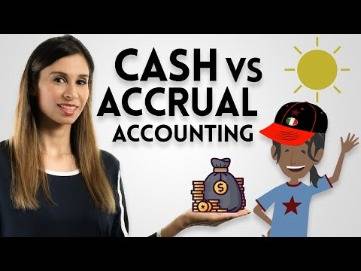
Your taxable period (also known as filing frequency) refers to how often you need to file your GST returns with IRD. When GST is charged at 0%, these are called zero-rated supplies. These are different from exempt supplies, which do not attract GST to begin with. Some examples include exports, land sales and selling a going concern business. If you do not choose a taxable period when you register, the IRD will automatically assign you the two-monthly period that matches your balance date.
With so many shoppers out and about, and also free to be online, it is an excellent opportunity for entrepreneurs to increase their sales. For example, if you claim on a television you supposedly bought for the business, but it lives in your living room at home, you’re not being honest, and you could be penalised if found out. If you’re not sure if an expense is truly business-related, it might be a good idea to talk to an accountant about eligible expenses for your line of work. Even though you do not collect any tax on the sale of zero-rated supplies, you still need to report these in your return. For example, if you are in the start-up or growth phase and you have large expenses but not as much income, you can get a GST refund when you file your return.
When to register for GST
Even though registering means extra work for your business, it has some advantages. If you’re unsure about whether your business needs to register, you can contact us or your tax agent. You can read about when a non-resident is deemed to make a taxable supply in New Zealand in section 8(2) to (4) of the Goods and Services Tax Act 1985. Prices shown in shops and online include GST unless they say otherwise — the GST part of what you’ve paid is printed on your receipts.
- If you’re an individual, the $60,000 threshold applies only to the income you earn that isn’t liable to PAYE.
- You can also charge GST (15%) on what you sell — this is collecting it on the government’s behalf.
- A digital product is any product that’s stored, delivered, and used in an electronic format.
- Most businesses normally advertised the pricing of goods inclusive of GST in their physical stores or online stores unless stated otherwise.
- Two-monthly means more paperwork but can be easier to keep track of.
He has lived, worked and travelled across 16 different countries before calling New Zealand home. He has now spent over a decade in the New Zealand tourism industry, clocking in more than 600 activities across the country. He is passionate about sharing those experiences and advice on NZ Pocket Guide and its YouTube channel. Robin is also the co-founder of several other South Pacific travel guides. Finally, for more essential advice for your trip, don’t forget to check out the 31 Tips for Travelling in New Zealand.
What is GST101A Form and GST103B Form?
Persons or entities with annual revenue less than $60,000 do not have to register for GST.[6] This threshold has increased three times since the introduction of GST in 1986. ”I think we have a lot of other things to offer in lifestyle, scenery and no snakes – but I really do think this is a big opportunity for us as a country,” she added. Bigger than movies and music combined, with 3 billion players worldwide, like it or not, gaming is now the premier form of entertainment on the planet. Tipping is not mandatory or expected in New Zealand, but it will be appreciated if you tip to reward exceptional service. For more information on what the IVL is, check out What You Need to Know About the New Zealand ETA & Visitor Levy (NZeTA & IVL). The IVL is said to be “a way for travellers to contribute directly to the tourism infrastructure they use and to help protect and enhance the natural environment”.

This will apply even if you do not make a profit from the sales. Some goods and services have GST charged at 0% — these are called zero-rated supplies and are typically provided to people overseas. Zero-rated goods and services include products or services from New Zealand that are sold overseas, eg exports or some how to prepare a trial balance for accounting land transactions. Zero-rated supplies still have to be recorded on your GST returns. On 1 October 2016, the taxation of digital (’remote’) services supplied by offshore companies (non-New Zealand) to consumers based in New Zealand changed. The same applies if your taxable period ending falls on 31st July.
Are Your Sales Taxable?
As a business supplying goods or services, you are liable to pay this tax. However, in practice, most businesses will factor the cost of GST into their prices so that they can recoup it from their customers. This tax is payable on most goods and services sold for domestic consumption in New Zealand, including certain imports.
- If you don’t think you’ll turn over that much, it’s up to you whether or not to register.
- You are not required to register for GST if your business turnover is less than $60,000 per year.
- The IVL costs NZ$35 and you will pay this either when you request your NZETA or when you apply for your Visitor Visa.
- Some rare services are exempt from GST and duty-free will offer items tax-free when landing in New Zealand from an international flight.
- The cost is NZ$9 through the mobile app and NZ$12 through the website.
- If your turnover falls below $60,000 a year and you don’t want to keep charging GST, or if you close down your business, you need to let Inland Revenue know — call or send a message via myIR.
This can be a calculation of sales in the last twelve months, or a prediction of sales in the next twelve months — any rolling year-long period, past or future. You can claim GST back from the IRD when you’ve purchased goods or services for your business. You can also claim GST back on bad debts where you have already paid the related GST to the IRD, but this will only apply if you are paying GST on an invoice basis, not a payments basis. This essentially enables you to pay the GST exclusive amount on products and services, rather than the inclusive price paid by ordinary consumers. Your business carries out a taxable activity when you supply (or intend to supply) goods or services for money (or another reward) on a continuous or regular basis.
How can I register for GST in New Zealand?
Once you’ve registered, you have to complete regular GST returns. Because businesses claim back their input GST, the GST inclusive price is usually irrelevant for business purchasing decisions, other than in relation to cash flow issues. Consequently, wholesalers often state prices exclusive of GST, but must collect the full, GST-inclusive price when they make the sale and account to the IRD for the GST so collected. Here at GST Portal we want to simplify your needs when it comes to Goods and Service Tax.
